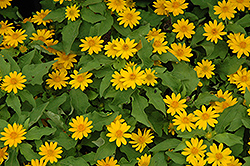It's all about ...
plants

Height: 24 inches
Spacing: 12 inches
Sunlight:
![]()
![]()
Hardiness Zone: (annual)
Other Names: Melampodium, Blackfoot, Gold Medallion Flower
Description:
One of the easiest flowering annuals to grow; sunny yellow blooms cover neat mounds throughout the season with no need to deadhead spent blooms; tolerant of shade and heat
Ornamental Features
Butter Daisy is bathed in stunning yellow daisy flowers with gold eyes at the ends of the stems from late spring to early fall. Its pointy leaves remain light green in colour with curious grayish green undersides throughout the season.
Landscape Attributes
Butter Daisy is an herbaceous annual with a mounded form. Its relatively fine texture sets it apart from other garden plants with less refined foliage.
This is a relatively low maintenance plant, and should not require much pruning, except when necessary, such as to remove dieback. It is a good choice for attracting bees and butterflies to your yard. It has no significant negative characteristics.
Butter Daisy is recommended for the following landscape applications;
- Accent
- Mass Planting
- Border Edging
- General Garden Use
- Container Planting
Planting & Growing
Butter Daisy will grow to be about 22 inches tall at maturity, with a spread of 14 inches. When grown in masses or used as a bedding plant, individual plants should be spaced approximately 12 inches apart. Its foliage tends to remain dense right to the ground, not requiring facer plants in front. This fast-growing annual will normally live for one full growing season, needing replacement the following year.
This plant does best in full sun to partial shade. It is very adaptable to both dry and moist locations, and should do just fine under typical garden conditions. It is not particular as to soil type or pH. It is somewhat tolerant of urban pollution. This species is not originally from North America.
Butter Daisy is a fine choice for the garden, but it is also a good selection for planting in outdoor pots and containers. It can be used either as 'filler' or as a 'thriller' in the 'spiller-thriller-filler' container combination, depending on the height and form of the other plants used in the container planting. Note that when growing plants in outdoor containers and baskets, they may require more frequent waterings than they would in the yard or garden.
